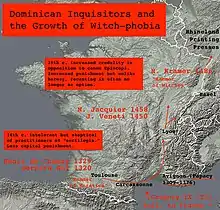Gianfrancesco Ponzinibio
Gianfrancesco Ponzinibio (fl. 1520) was a European jurist who criticized the relatively new change in Christian doctrine that had become popular in the 15th century especially among Dominican inquisitors and that espoused a belief in the real supernatural power of witchcraft.[1] Ponzinibio argued in favor of maintaining the ancient Christian theology as stated in the canon Episcopi.[2] Ponzinibio's views soon came under attack by witch-phobic theologians like the Dominican Silvestro Mozzolino of Prierio (later Dominican General) who in 1521 published a work that did not attempt to defy the canon Episcopi but stating his opinion that to deny the real power of witchcraft would be "to discredit the infinite number of cases tried by the Inquisition, and consequently to discredit the laws themselves." Other critics of Ponzinibio soon followed including Bartolomeo de Spina, who devoted three tracts to refuting Ponzinibio's arguments and calling upon the Inquisition to prosecute Ponzinibio under suspicions of heresy and for the defending of heretics.[3]

Life
According to the archivist Joseph Hansen, a foremost historian of the European witchcraft trials, no information has been found about Ponzinibio's life outside of what can be gathered from his tract.[4]
References
- "About this time the learned jurist, Gianfrancesco Ponzinibio, wrote a tract on the subject of witchcraft in which he upheld the doctrine of the Cap. Episcopi and boldly applied it to all magic and sorcery which he treated as delusions." Henry Charles Lea, A History of the Inquisition vol. III p.498.
- "Francis Ponzinibius is the only one amongst the Papists of former Ages, who opposes their common opinion, and affirms that they are not corporally carried, but only deluded by Dreams and Phantasms." Phillip Limborch History of the Inquisition (1692) English translation p. 107. Note, Limborch's views are somewhat over-stated and some Protestant (Calvinist) bias can be seen in the term "papists." Witch-phobic doctrine remained a contested view in all confessions and a number of Catholic theologians maintained the canon Epicopi as gathered in the work of Joseph Hansen, see below.
- HC Lea vol. III p. 499.
- Joseph Hansen Quellen (1901)p.313 reprints Ponzinibio and those opposed.